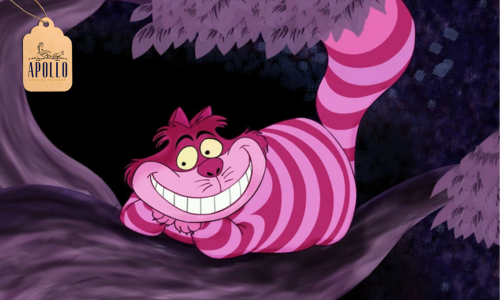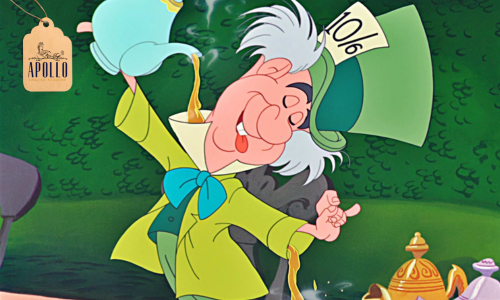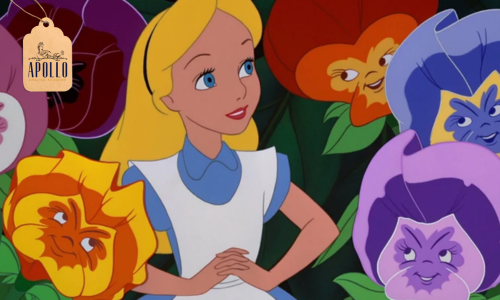Introdução
Esta semana, comemoramos o lançamento de um dos livros mais encantadores (e estranhos!) da literatura: Alice no País das Maravilhas. Sabe aquela história que faz a gente viajar sem sair do lugar, com chás malucos e coelhos atrasados? Pois é! No texto de hoje, a gente mergulha de cabeça nesse clássico pra te mostrar que ele é muito mais do que um conto infantil. Ele é uma fonte incrível de inspiração e uma ferramenta secreta pra quem tá aprendendo inglês, cheio de vocabulário curioso, frases icônicas e uma boa dose daquela imaginação que a gente adora. Vem com a gente pra esse mundo de maravilhas e descubra o que Alice tem a ensinar!
📖 Aqui você encontra…
clique para verNível: B1 (Intermediário)
Objetivo: Celebrar o aniversário de “Alice no País das Maravilhas”, explorando o valor literário e linguístico da obra para estudantes de inglês, destacando o vocabulário, a gramática e a flexibilidade mental que a leitura pode proporcionar.
Tópicos gramaticais abordados nesse texto:
- Present Simple: Para descrever características da obra e fatos gerais (“Alice’s Adventures in Wonderland has been charming”, “Lewis Carroll was a master”).
- Modal Verbs: Para expressar possibilidades e conselhos (“it just might be the perfect companion”, “reading Alice can help learners”).
- Gerunds e Infinitivos: Em frases como “reading Alice is like taking a grammar and vocabulary class” e “to question meaning, play with logic”.
- Vocabulário Abstrato e de Substantivos Compostos: Termos como nonsense, wordplay, curiosity, transformation, mental flexibility.
- Expressões Idiomáticas e Frases Icônicas: “Down the Rabbit Hole”, “Mad Tea Party”, “We’re all mad here”.
- Conectivos de Causa e Consequência: Para ligar ideias e argumentos (“For English students, reading Alice is like…”, “These elements help students build confidence”).
Escute aqui a transcrição:
Easy
Advanced
Celebrating Alice’s Adventures in Wonderland
July 4th marks the anniversary of the publication of Alice’s Adventures in Wonderland, Lewis Carroll’s iconic tale that has been charming, confusing, and inspiring readers for over 150 years. But this book is more than a whimsical children’s story: it’s a surreal masterpiece of imagination, wordplay, and curiosity. And it just might be the perfect companion for English learners.
A Nonsense Classic That Makes Sense
From mad tea parties to talking rabbits, the world of Wonderland is famously absurd. But behind all the nonsense lies a brilliant use of language. Lewis Carroll (a pen name for Charles Dodgson) was a master of wordplay, creating jokes, riddles, and even new words like “chortle” and “galumph.” For English students, reading Alice is like taking a grammar and vocabulary class wrapped in fantasy.
Wonderland invites us to question meaning, play with logic, and embrace curiosity — all essential attitudes for language learning. If you’ve ever gotten confused by irregular verbs or prepositions, don’t worry. Alice would understand.
What English Learners Can Learn from Alice?
When Alice says, “I can’t go back to yesterday, because I was a different person then,” she isn’t just being poetic. She’s showing us the power of transformation, the same kind that happens when we start thinking in another language.
Reading Alice in Wonderland helps learners encounter creative idioms and unusual expressions, while also becoming familiar with sentence structures that break away from predictable patterns. The imaginative conversations between characters challenge the reader to follow unexpected twists, which is great training for developing fluency and mental flexibility.
These elements help students build confidence, especially when they need to follow fast conversations or respond in real time without translating everything in their head. In other words, learning English becomes less about rules and more about rhythm — something Wonderland understands very well.
Alice in Pop Culture and the Classroom
Alice’s Adventures in Wonderland has inspired countless films, songs, artworks, and academic discussions. From the Disney classic to Tim Burton’s reimagined version, Alice continues to be a cultural icon and a classroom favorite.
In an educational context, this story is a fantastic way to stimulate creative writing and storytelling. It encourages students to imagine their own wonderlands, to think about abstract concepts like identity, time, and change, and even to reflect on existential questions through whimsical dialogue. Discussions like “Was the Mad Hatter really mad?” or “What does the Cheshire Cat actually represent?” turn English class into a journey through ideas, not just grammar exercises.
And of course, it’s full of quotes that stick with you, like: “We’re all mad here.” or “Who in the world am I? Ah, that’s the great puzzle!”
Let’s be honest: learning English is sometimes like wandering through Wonderland. It’s confusing, funny, challenging — and totally magical.
Get to know Apollo!
Quer transformar o aprendizado de inglês em uma verdadeira aventura? Aqui na Apollo Academy, usamos histórias, cultura pop e criatividade para deixar o inglês mais leve, interessante e eficaz. Fale com a gente e comece sua jornada — sem precisar cair em um buraco de coelho!
🎉 Go to a Crazy Party: What’s Your Vibe? 🎉
Are you the life of the party with a mysterious grin? The eccentric host with a flair for the dramatic? Or just trying to figure out where you parked your unicorn? Dive into this wild quiz and find out your true party persona!
You arrive at the party. What's the first thing you do?

What's your go-to party outfit?

Someone asks you a weird question, like "Do you believe in purple unicorns?" How do you answer?

The music changes to something totally unexpected (e.g., opera at a pop party). Your reaction?

What kind of snacks are you drawn to at the party?

You overhear someone gossiping. What do you do?

It's getting late. How do you plan your exit?

What's your lasting impression on others after the party?











